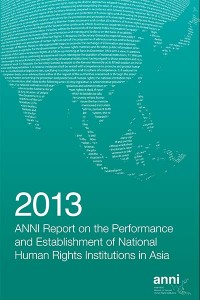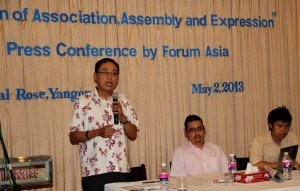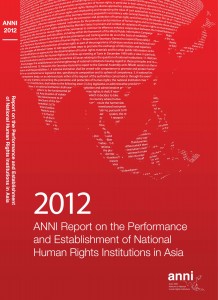Posts Tagged ‘Human Rights Education Institute of Burma’ (13 found)
2013 ANNI Report on the Performance and Establishment of National Human Rights Institutions in Asia
 National Human Rights Institutions (NHRIs) have become increasingly prominent actors in the national, regional and international human rights arenas. When able to operate independently and effectively, they are important mechanisms that constitute an effective complement to the judiciary and other institutions in the national infrastructure tasked with the promotion and protection of human rights.
National Human Rights Institutions (NHRIs) have become increasingly prominent actors in the national, regional and international human rights arenas. When able to operate independently and effectively, they are important mechanisms that constitute an effective complement to the judiciary and other institutions in the national infrastructure tasked with the promotion and protection of human rights.
2012 (and significant events in the first half of 2013) represented a litmus test for many NHRIs in the region. There were significant events for Asian states: such as budding attempts towards democratic transition; and states that faced internal conflict or communal violence, among others. Often, this involved the complicity of state actors, which renders the fight against impunity a formidable challenge.
This report includes a chapter entitled “Lost in Transition” that looks at the Myanmar National Human Rights Commission […]
Burma: Release Ten Arakanese Activists, Amend Peaceful Assembly and Peaceful Processions Law
Targeted Prosecutions of Peaceful Protesters Continue
The government of Burma should immediately release ten Arakanese activists convicted of violating Burma’s Law on Peaceful Assembly and Peaceful Procession after protesting a Chinese-led natural gas project in western Burma, four nongovernmental organizations said today. On 26 September, the ten activists were sentenced to three months in prison for their participation in a peaceful protest against adverse impacts of the transnational gas project on 18 April on Maday Island in Burma’s western Arakan State. The Shwe Gas Movement, Burma Partnership, Human Rights Education Institute of Burma and Fortify Rights International called today for the immediate release of the activists and for the urgent amendment of the controversial law […]
• • •Parliament Must Delay Deliberation on the Myanmar National Human Rights Commission Law
The Myanmar National Human Rights Commission (MNHRC) Law will be discussed in the Upper House of Parliament on Monday 29 July 2013. The draft legislation was published in the state-run newspaper The Mirror on 7 July 2013, giving less than one month for civil society and the public to provide recommendations […]
• • •Open Letter to President U Thein Sein on the Arbitrary Arrest, Incommunicado Detention and Unfair Trial of Human Rights Defenders and Peaceful Protesters
Your Excellency,
Burma Partnership, a regional democracy and human rights advocacy network, and Assistance Association for Political Prisoners – Burma, a political prisoner monitoring and advocacy group, along with the human rights organizations endorsing this letter, wish to draw your attention to the arbitrary arrest, prolonged incommunicado detention, and unfair trial of human rights defenders and peaceful protesters, most recently in Salingyi Township, Sagaing Region […]
• • •Burma: Human Rights Groups Condemn Ongoing Crackdown on Protests and Peaceful Assemblies
 Report Highlights Violations of Freedoms of Expression, Peaceful Assembly and Association
Report Highlights Violations of Freedoms of Expression, Peaceful Assembly and Association
The Asian Forum for Human Rights and Development (FORUM-ASIA), together with its member Human Rights Education Institute of Burma (HREIB), and Burma Partnership, called on the Burma government to respect the freedoms of expression, peaceful assembly and association […]
Oral Statement at the Interactive Dialogue with the UN Special Rapporteur on the Situation of Human Rights in Burma/Myanmar
Thank you, Mr. President. FORUM-ASIA, in association with its member organisation Human Rights Education Institute of Burma (HREIB) and Burma Partnership, welcomes the report of the Special Rapporteur (A/HRC/22/43) which demonstrates the need for sustained attention of this Council on the human rights situation in the country. The Special Rapporteur’s present mandate must be maintained even in the context of the positive developments as serious human rights violations remain unaddressed […]
• • •2012 ANNI Report on the Performance and Establishment of National Human Rights Institutions in Asia
 The past couple of years have seen an increasing international recognition of the role of NHRIs in the promotion and protection of human rights. A growing number of Asian countries have either recently established or are considering the establishment of NHRIs, including in Burma, where the Myanmar National Human Rights Commission (MNHRC) was set up in September 2011. Meanwhile the UN Human Rights Council on 16 June 2011 adopted a resolution on “National Institutions for the Promotion and Protection of Human Rights” – the first-ever Human Rights Council resolution to focus specifically on the work of NHRIs.
The past couple of years have seen an increasing international recognition of the role of NHRIs in the promotion and protection of human rights. A growing number of Asian countries have either recently established or are considering the establishment of NHRIs, including in Burma, where the Myanmar National Human Rights Commission (MNHRC) was set up in September 2011. Meanwhile the UN Human Rights Council on 16 June 2011 adopted a resolution on “National Institutions for the Promotion and Protection of Human Rights” – the first-ever Human Rights Council resolution to focus specifically on the work of NHRIs.
The resolution acknowledges the significant role of NHRIs in the promotion and protection of human rights at national level, as well as their important role in the Human Rights Council, and calls for further cooperation with regional coordinating bodies of NHRIs. These developments are set against the backdrop of a general deterioration in the situation of human rights in many countries in Asia. This can be seen, for example, in the adoption of various repressive laws such as national security laws […]
• • •Open Letter to Norwegian Ambassador Katja Nordgaard on Myanmar Peace Support Initiative (MPSI) Consultation
Dear Ambassador Nordgaard,
At the outset, we state that we welcome Norway’s MPSI. We view such initiative to have the potential of furthering peace processes, especially in the ethnic areas. As such, consider us as peace building actors and we are willing to provide our support where necessary.
However, we feel Norway is unable to demonstrate a good practice for MPSI consultations […]
• • •Civil Society Organisations Meet ASEAN Intergovernmental Commission on Human Rights on the ASEAN Human Rights Declaration, Call for Universal Standards to be Upheld
Representatives of Civil society organisations (CSOs) have today met the AICHR for the first time for a consultation on the drafting of the ASEAN Human Rights Declaration. The organisations have welcomed the Consultation as a positive step in the right direction. They also welcome the constructive and friendly atmosphere in which the Consultation was held, and the openness of AICHR representatives to the comments and suggestions by CSO representatives.
We nevertheless regret that the Consultation was short, late, without a draft to comment on and with civil society only partially represented and some organizations rejected […]
• • •Statement on the 4th Anniversary of the Saffron Revolution
“We Want Real Change in Burma, Not Public Relations Games”
On the 4th anniversary of the Saffron Revolution, an alliance of Burma‐related organizations in Chiang Mai has organized this candlelight vigil and rally to call on the international community to maintain pressure on Burma’s regime until it carries out a genuine democratic transition by immediately and unconditionally releasing all political prisoners and ending impunity for human rights abusers […]
• •








 All posts
All posts